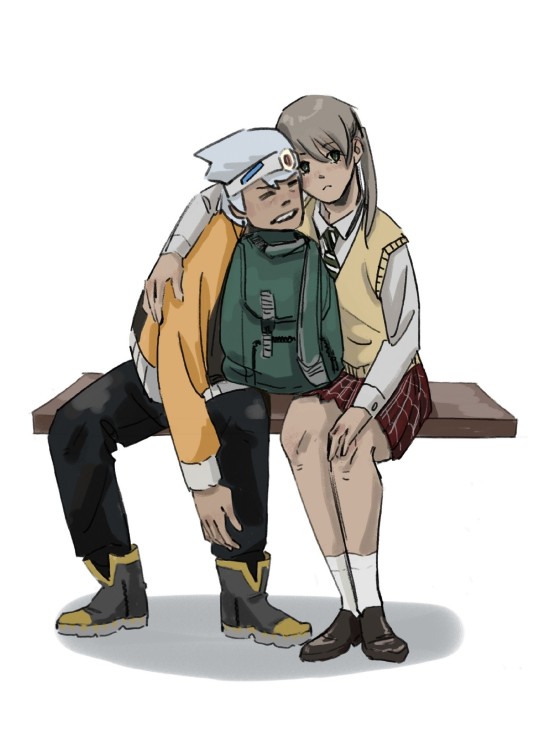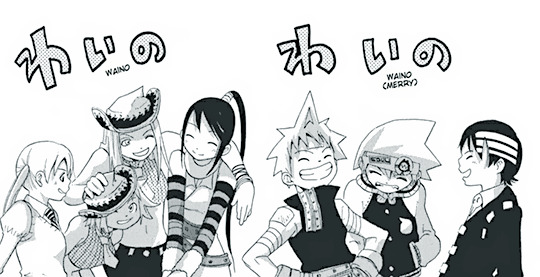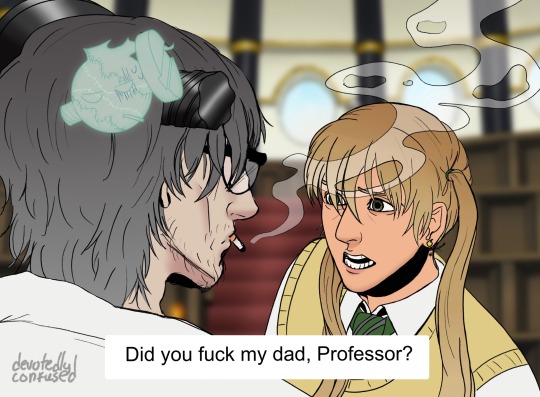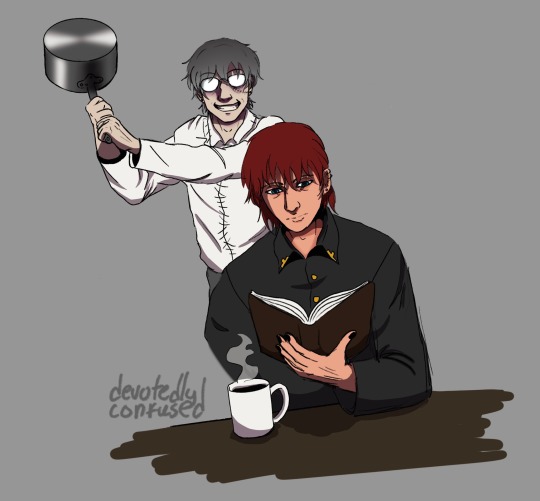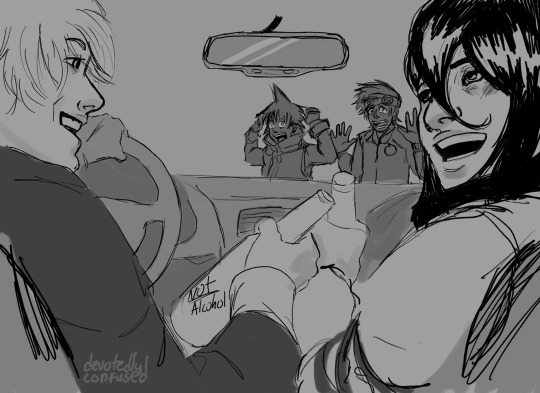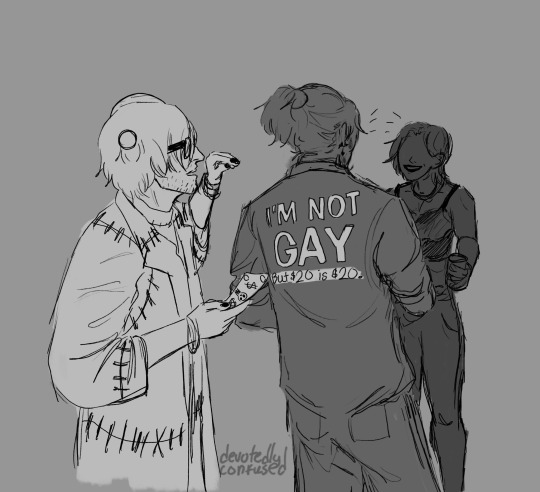Text
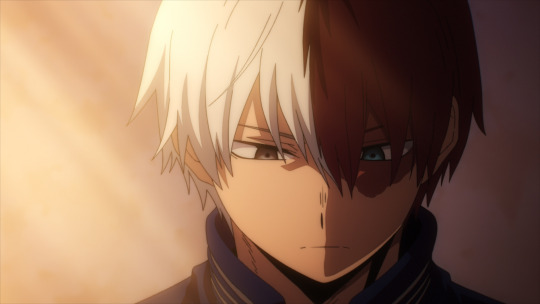

Todoroki brothers preview pictures for the 3rd recap episode
"Memories: Thoughts"
100 notes
·
View notes
Text
How the Todorokis call each other (Part 2)
So this is a continuation of my previous post.
Here I'll focus more on how the Todorokis call each other when they're trying to be from confidential to rude to outright insuling.
WE DON’T WANT TO SAY THE NAME
There are various instances in which the characters don’t want to say the name of the person they’re talking about so they uses other ways to imply it... even though generally it would be more polite to say the name of the one you're talking about. It's not necessarily rude/insulting as the Todorokis, being a family, are allowed to a level of informality among them but sometimes the key is also in the intention of the speaker. Anyway I'm reporting them, do with them what you want.
Ano (あの “That”) + noun
Ano can be translates as “that” but implies someone/something far from the speaker and the addressee.
I’ll list some examples but probably more escaped me.
In chap 252 Enji refers to Fuyumi as ‘ano ko’ (あの子 “that child”).
In chap 39/187 Rei calls Enji ‘ano hito’ (あの人 “that person”).
In chap 301/302 Rei refers to Tōya as ‘ano ko’ (あの子 “that child”) which happens when saying Enji isn’t the only one who didn’t see him and when she says Tōya wanted Enji to look at him.
In chap 39 Rei refers to Shōto as ‘ano ko’ (あの子 “that child”) when talking with her mother.
In chap 189 Fuyumi calls Enji ‘ano hito’ (あの人 “that person”).
In chap 187 Fuyumi refers to Shōto as ‘ano ko’ (あの子 ‘that child’).
Kono (この “This”) + noun
We met Kono before, when he was used to add emphasis. In this case instead it can be translates as “this” but implies someone/something is near the speaker.
In chap 291 Enji refers to Tōya as ‘kono ko’ (この子 “this child”)
Aitsu (そいつ “that person”)
Implies the person isn’t near to the speaker or the listener… and can also imply a certain emotional distance between the speaker and that person. It’s very informal and can sound gruff or rude when used.
In chap 202 Enji used it to refer to Tōya.
In chap 301 Tōya used it to refer to Enji.
In chap 187/189 Natsuo used it to refer to Enji.
In chap 55/249 Shōto used it to refer to Enji.
Koitsu (こいつ “this person”)
'Koitsu' is a very impolite expression that's used to refer to "this person." Although some people may refer to a friend as such, this is usually only if they have an intimate and casual relationship with them.
In chap 39 Shōto refers to Enji as ‘oyaji’ (親父 “old man”) but the hiragana says ‘koitsu’ (こいつ “this person”).
Considering how Shōto looks angry, he's likely using it to be impolite, even though the sentence is actually a thought, though this might be just me.

Yatsu (奴 “guy”)
Tecnically 'yatsu' means “guy” but the nuance here is that you're either using for someone you're close to, therefore in a familiar way, or it comes out as derogatory.
In chap 38 Shōto refers to Enji as ‘yatsu’ (奴 “guy”) to say his father doesn’t look happy.
While Shōto, being related to Enji, could have a degree of familiarity with him, I would say in this case it comes out as more derogatory than familiar... but it might be just me.
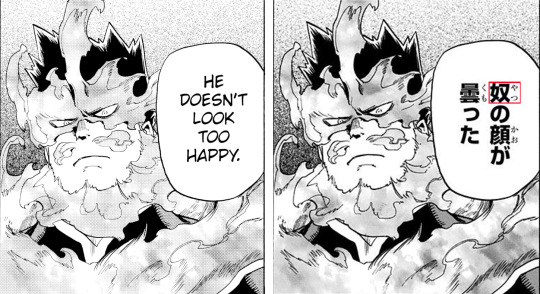
Are (アレ)
‘Are’ might feel like an insulting way to call someone because it’s usually translated as “that thing” but ‘are’ can also be used for people that both you and the person(s) you are talking to know (have already met) (but that are far from you/are not present) or when sharing an opinion/idea/info with the reader/listener. It has an ‘you know who I mean’ feeling. It’s used to omit a detail, avoid repetition, or because you want to avoid direct mention (because it’s embarrassing, it’s something you shouldn’t talk about, can’t remember what it’s called or too lazy to try and mention it). The fact that it’s written in katakana instead than in hiragana (あれ can also be used) gives it a tone of mild condescension or an attempt at talking behind someone’s back.
In chap 31 Enji refers to Shōto as ‘Are’ (アレ “that one we’re talking about”) when talking with All Might.
In chap 39 Enji refers to Tōya, Fuyumi and Natsuo as ‘Nī-san-ra’ (兄さんら “(your) big brother and the others”) but the reading is ‘are-ra’ (アレら “those we’re talking about”) when talking with Shōto.
In chap 350 Tōya refers to Enji as ‘are’ (アレ “that one we’re talking about”) 3 times.

It's interesting to wonder why they decided not to say the name of the one they're talking about but go for 'are'.
In regard to Enji, in the first case, he kind of unterlines it (the dots over the kanji work as a way to underline them), it might be as a way to talk with All Might about Shōto more as a mean he's using to surpass All Might than of Shōto himself as a person.
In the second instead it might be to underline the separation from Shōto and his siblings as they live in different words.
In Tōya's case it might be to keep distance. He's talking of Endeavor and his father at the same time but calling one or the other might not feel right to him.
Still mine are all speculations. Do your pick on why they're doing so.
WE’RE DELIBERATELY GONNA BE RUDE!
Just to refresh everyone's mind, I mentioned in the previous post how some ways to say "you" are rude or outright insulting ('anta', 'kisama' 'temeE') but now we're gonna dig into other ways the characters had to insult each other.
Surname and name with no suffixes attached
When calling a stranger, in order to be polite, you should use the surname plus a suffix (-sama, -san, -kun...).
Not doing so is rude but rudeness is expected in an enemy (Shigaraki calls Midoriya just 'Midoriya')... however you usually don't also add the name unless you've two people with the same surname and needs to specify who you're talking with... so that when Tōya does so, first with Shōto in chap 82 and then, even more relevant since he didn't use his Hero name, with Enji in chap 191, it gives off a sense of familiarity as if he knew them personally... which was meant to be a hint to his true identity.
Tōya also refers to his father by surname and name a couple of times post reveal (chap 290/294/301) but he likely does so to keep distance from him (kind of like how his family calls him Dabi post reveal) or to talk of Enji as the man and not as the Hero. Do your pick.

Just the name with no suffixes attached
When fighting Tōya in chap 292/294 Shōto calls him just ‘Tōya’, without the ‘Nī’… which is a rude way to refer to your older brother (while, as said before, it's perfectly fine to refer to your younger brother with just his name). Yes, Tōya was an enemy so we find perfectly normal for him to be rude but compare this with how Yoichi always calls his brother ‘Nī-san’ despite everything. That’s because, regardless of being adversaries, being his younger brother, he should still be polite with him and acknowledge he’s his older brother. Interesting enough in chap 349 he calls him first just ‘Tōya’ but then immediately switches to ‘Dabi’, which was the default family cooping mechanism to keep ‘Tōya’ divided from ‘Dabi’… although here and there he again acknowledges Tōya as his brother during the fight and, in his mind, resumes calling him ‘Tōya Nī' when he remains impressed by how his brother managed to copy his technique and therefore showed Tōya’s strength didn’t lie merely in his sheer firepower... and from then on he'll keep on calling his brother as such.

Iranē kodomo (いらねー子ども “the child/children he didn’t need”)
Not quite an insult but surely not flattening it’s how Natsuo calls himself and his siblings when he talks of how Enji left them behind in chap 189.

Aho (阿呆/あは/アホ “fool”)
'Aho' is generally used with the meaning of "fool", "simpleton".
Now… according the region ‘aho’ is a stronger or tamer insult than ‘baka’ so it’s hard to say with which intensity level it’s used even if I compare the way Tōya used both ‘aho’ and ‘baka’. Tōya used ‘Aho’ for Mister Compress when he believed he let Shōji Mezō rob him and ‘baka’ for Himiko when she asked him if she could stab Bakugō. Since Tōya is more polite with Mister Compress than with Himiko we can assume ‘aho’ is tamer, but if Compress had really let Shōji rob him the mistake would be worse so it can be it’s worse. Do your pick.
In chap 29 Enji refers to Shōto as ‘aho’ (阿呆 “fool”) when Shōto’s refusal to use his left side is putting him at disadvantage against Midoriya in the cavalry battle.
What's interesting to notice is that Enji uses it in kanji, while Tōya uses it in katakana, therefore giving it more emphasis.

Baka aniki (馬鹿兄貴).
‘Baka’ (馬鹿/ばか/バカ) literally means “horse deer” and is an ateji, which means either the readings of the individual kanji do not match the reading of the word, or the meanings of the individual kanji do not match the meaning of the word. The etymology is uncertain. Some say it could be from a Chinese idiom “point at a deer and call it a horse”, other say it derives from a Sanskrit word meaning “fool”. Regardless of all this it means “stupid”/“foolish”. Generally it’s written in katakana, to also convey how the speaker is really angry and can be used without a noun after it (Bakugō, when saying Shōto he's an idiot in chap 249 uses it in katakana with 3 extra 'a' to remark how he draws it out longer than it should be for emphasis 'baaaaka' バアアアカ "Idiiiiot"). Another common way to write it is in hiragana and writing it in kanji is being considered more a literature way to write it. Tōya in chap 86 also uses kanji to call Himiko ‘Baka’ (馬鹿 “stupid”) when she asks if she can stab Bakugō... so I'm not sure why Shōto is using kanji, maybe it feels more 'polite' as he's still talking with his older brother with whom he has no closeness. No idea. I've mentioned in the previous post how ‘aniki’ (兄貴) is still a way you can use to call your older brother but it’s considered less formal than ‘onī-san’/‘nī-san’... so it fits that when insulting Tōya before fighting him Shōto would choose 'aniki'.
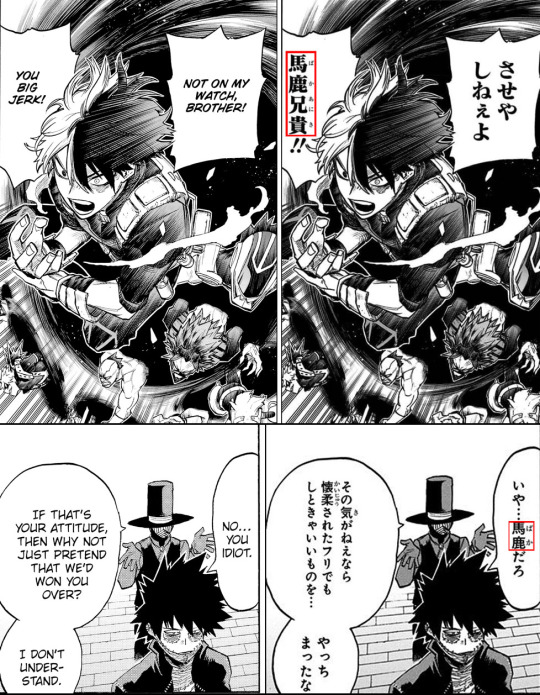
KUSO Oyaji (クソ親父)/KUSO Aniki (クソ兄貴)
‘Kuso’ (糞/くそ “shit”), usually written in katakana (クソ) is generally used as a curse word with the meaning of “shit”/“damn”/“fuck” though of course the nuance changes according to situations. Combined with ‘oyaji’ or ‘aniki’ works as a pejorative and turns them into something that sounds like “shitty old man/brother”/“damn old man/brother”, in short makes it an insult or express angers toward that person. Shōto use it for Enji more than once in the early part of the story, Tōya does so in chap 390 with Enji solely when he’s telling him to die while Natsuo does so with Tōya when he’s telling him not to cause troubles for other people. Of course the nuances in the three cases change. Shōto uses it talking about Enji to show to others how he loathes him, Tōya is being as rude and confrontational as possible as he calls Enji as such on his face, Natsuo is angry but being angry is also Natsuo’s way to cover up his pain by sounding tough. He was close to Tōya so he could use something stronger than just 'baka' to convey his feelings.
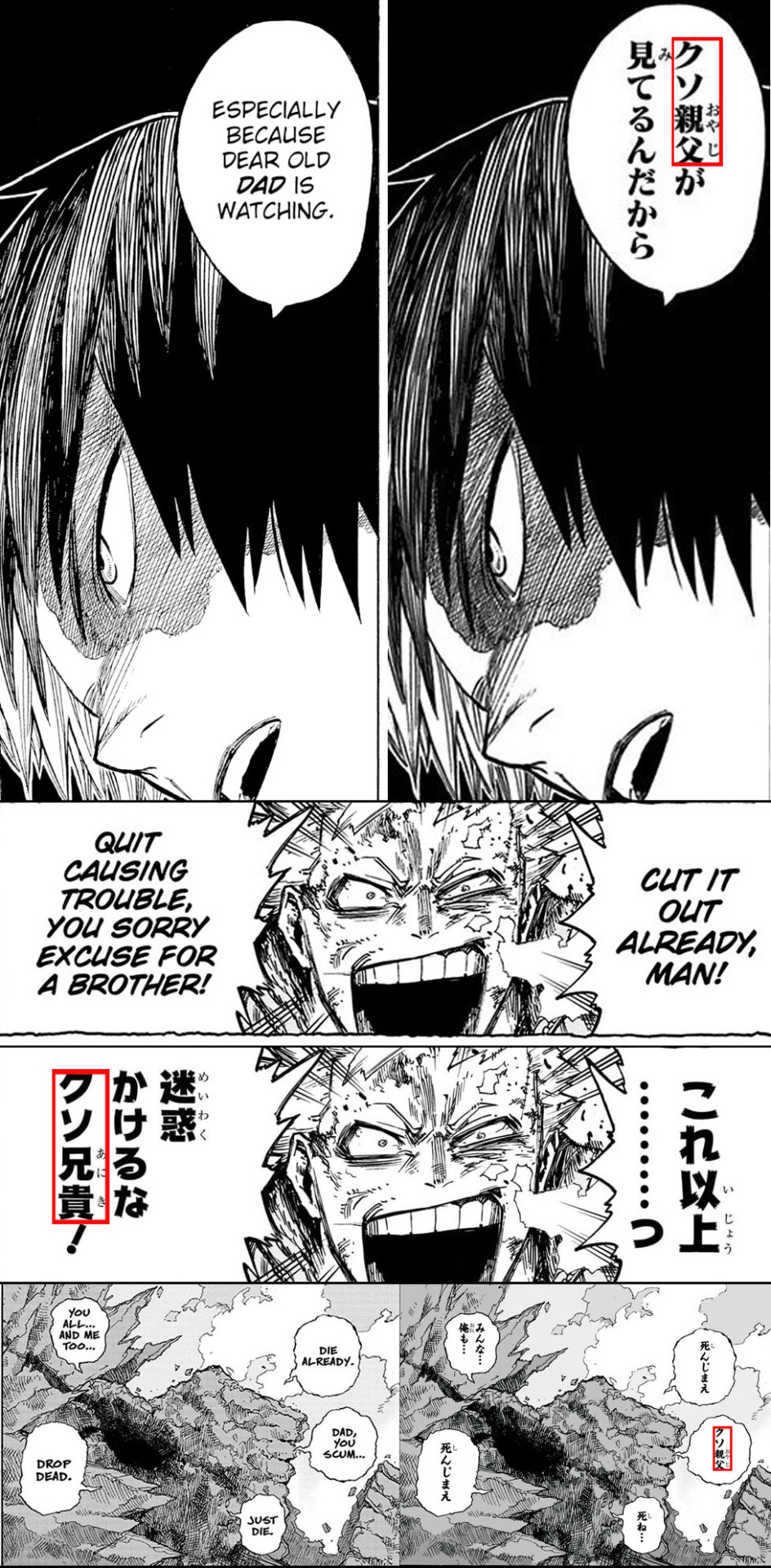
IKARE (イカレ/いかれ “crazy/(mentally) broken”), IKARE onna (イカレ女 “crazy woman”), ‘IKARE yarō’ (イカレ野郎 “crazy guy”), ikareru (いかれる “to go crazy”)
It’s an expression that imply someone is not normal (ironically it can also imply ‘madly infatuated’)… It could be written in hiragana but it’s almost always all in katakana in the story as to remark it.
Tōya uses it a lot, in chap 191 for himself, way too often for Himiko but also for Mustard and Imasuji Gōto when he calls them all ‘IKARE yarō-domo’ (イカレ野郎共 “crazy guys/crazy bastards”) when he tells them they won’t attack yet.
Just to clear things up as it's a word that will come up later on, 'yarō' (野郎) mean “guy” but unless you're familiar with that person, it comes out as rude so it's often translated as "bastard".
Natsuo prefers to use it for Enji as he does so in chap 189 and in chap 192. Shōto used it for his father in chap 251 when talking with Tōya and for Tōya himself in chap 292.

P.S. in order to make things simple in the image above I only boxed 'ikare' even though sometimes that 'ikare' was part of the verb and therefore the whole word was longer.
Shippaisaku (失敗作 “failed creative work”)
It’s normally not an insult but it’s clear the way it’s used in the story makes it not flattering. Tōya uses it a lot (chap 290/293/302/350) to refer to himself (and Fuyumi and Natsuo) to the point in a way the word failure ('shippai' 失敗) is triggering for him as, when All for One uses it while he’s in the orphanage to say they couldn’t restore him to his former strength, Tōya’s mind jumps back to when he was a child and his hair started to turn white (which is what he believed caused him to become a failure in his father’s eyes) and then rejects whatever he’s told.
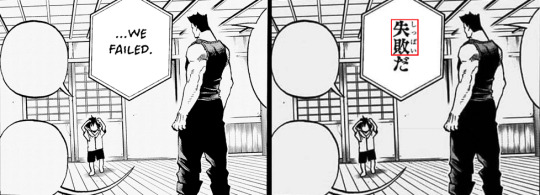
Compared to Tōya, Natsuo uses it in a less direct manner as when he talks with Enji in chap 192 the kanji say ‘Shippaisaku’ but the reading given is ‘Ore-tachi’ (俺たち “we/us”) so Enji doesn’t hear him saying ‘Shippaisaku’ were Tōya instead always said it with the correct reading.
Interesting enough I couldn’t find a time in which Enji referred to Tōya, Natsuo or Fuyumi as such so it can be he never did it but Tōya read it as such because he knew why Enji wanted to have children and also Enji has referred to Shōto as ‘Saikō kessaku’ (最高傑作 “Greatest masterpiece”).
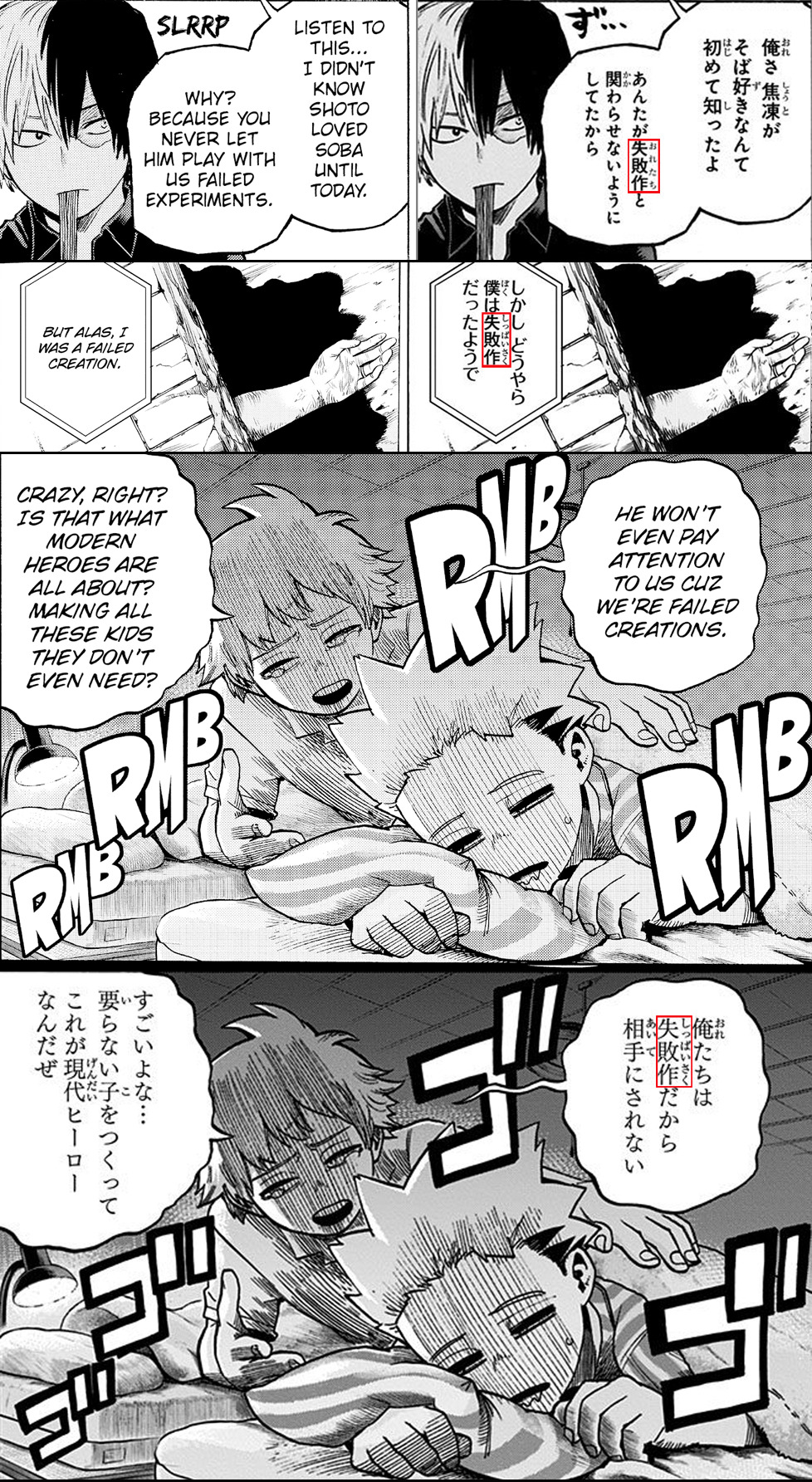
Saikō kessaku (最高傑作 “Greatest masterpiece”)
Okay, since it just got mentioned let's talk of this which is technically not an insult but it's how Enji sees and defines Shōto as such in chap 34. While Enji uses it as a form of phraise, Shōto rightfully doesn't take it as such and Tōya outright uses it in a bitterly yet mocking way to call Shōto (chap 293/294/349/351) so I figured it could fit in this list.
It's worth to mention that, on a similar line, Tōya refers to Shōto also as ‘Seikōsaku no Shōto’ (成功作の焦凍 “Shōto, the successful creative work”) and ‘Taibō no kessaku’ (待望の傑作 “Long awaited masterpiece”) when talking with Enji in chap 291 and then, in chap 293 'Saikō kessaku no oningyō' (最高傑作のお人形 "greatest masterpiece of a puppet") while talking with Shōto.

Oningyō/ningyō (お人形/人形 "puppet")
As usual the addition of the initial ‘o’ (お) adds a layer of politeness to the word 'ningyō' which means "doll" or "puppet" but also, in a figurative way, "someone who carries out actions for someone else".
I've kind of mentioned it previously but Tōya also refers to Shōto as Enji's 'oningyō/ningyō'.
He first does it in chap 290 where, when talking with Enji, he refers to Shōto as ‘omae no Ningyō’ (おまえの人形 “your doll/puppet”), continues in chap 293 with calling Shouto 'saikō kessaku no oningyō' (最高傑作のお人形 "greatest masterpiece of a puppet") and even get deeper in the idea in chap 351 by calling him ‘furafura chūtohanpa no ningyō’ (フラフラ中途半端の人形 “unsteady/aimless unfinished/incomplete doll”).
‘Furafura’ (フラフラ/ふらふら) implies one is “unsteady on his own feet, staggering, aimless, dizzy”.
'Chūtohanpa' is formed by the kanji for 'chū' (中) "middle", 'to' (途) "way" 'han' (半) "half" and 'pa' (端) "begining" or "ending", so it losely means something is "halfway from being finished" or that is "halfway after the start".
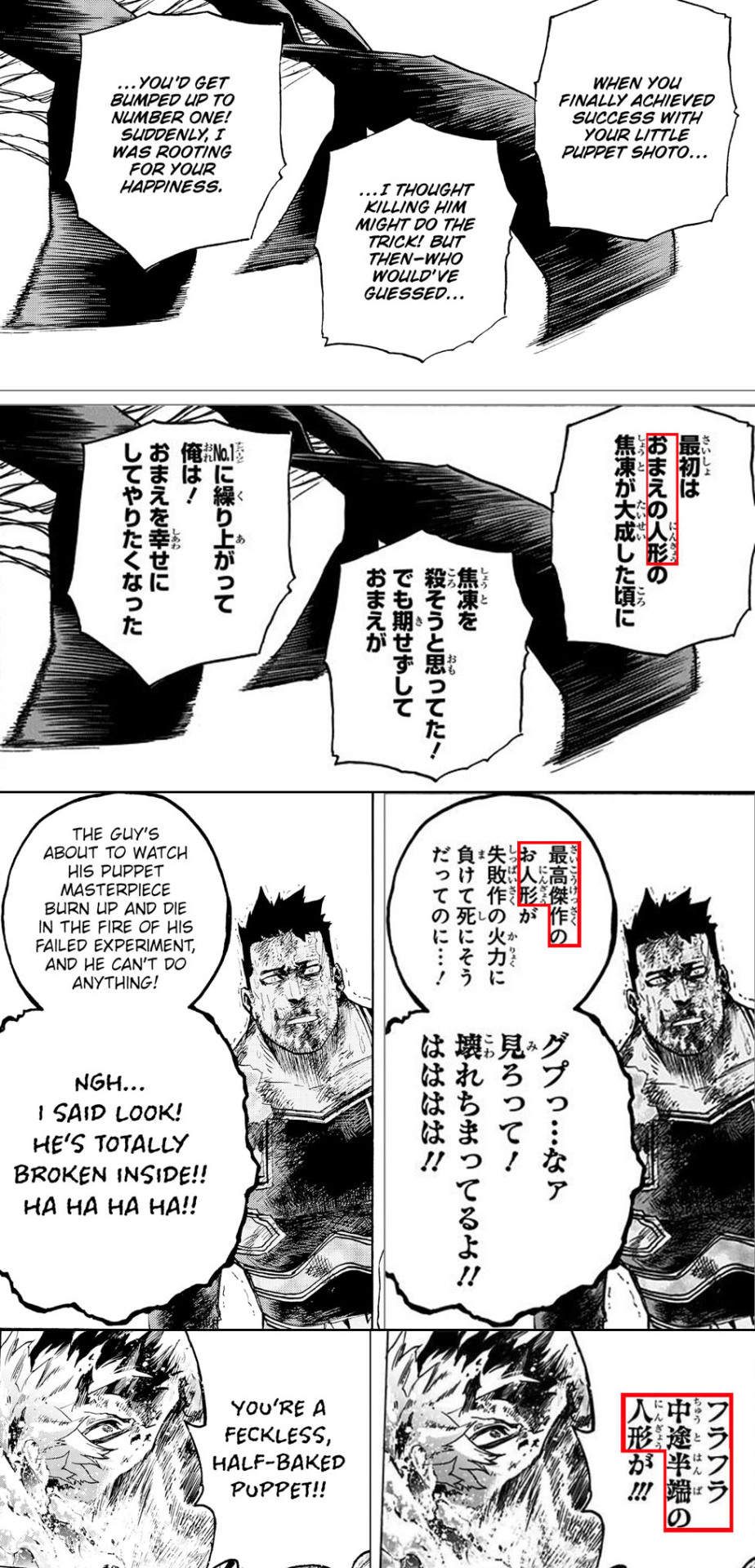
Hanpamono (半端者 “halfwit/fool”) and hanpa na otōto (半端な弟 “halfway/incomplete little brother”)
‘Hanpamono’ (半端者) litterally means that someone (者 ‘mono’) is half began or half finished (半端 ‘hanpa’), in short, incomplete, but it's also used as an insult to say someone is a “halfwit/fool/blockhead”.
‘Hanpa na otōto’ (半端な弟) is again made by ‘hanpa’ (半端 “incomplete”), ‘na’ (な) which in this case should indicate emotion or emphasis and, of course ‘otōto’ (弟) which means “little brother”.
In chap 351 we've Shōto use both ways to define himself in answer to Tōya's words.
It's worth to mention the word 'han' (半 "half") is kind of tied to Shōto, fans might be familiar of how Bakugō often called him 'hanbun yarō' (半分野郎 lit. "half part guy/half bastard") and I've just mentioned how Tōya called his brother ‘furafura chūtohanpa no ningyō’ (フラフラ中途半端の人形 “unsteady/aimless unfinished/incomplete doll”).

Koma (コマ/こま/ 駒)
A 'koma' is how you call a piece in shōgi or chess... but, of course, figuratively, it's also how you call someone's puppet, so in a way it's similar to 'ningyō'.
In chap 349 Tōya calls Shōto ‘otō-san no omoidōri no koma’ (お父さんの思い通りのコマ “father’s desired piece”)... because, I guess, he likes to use an assorted way to name-calling people. I'm totally not going to be surprised if I missed some of the not flattering ways he uses to refer to others.

Dōgu (道具 “tool”)
Tōya used 'koma' to define Shōto but Shōto instead in chap 31 said he wouldn't become Enji's ‘dōgu’ (道具), which is a “tool, implement, instrument, utensil, apparatus, device”, the full sentence being he won’t become ‘sonna kuzu no dōgu’ (そんな屑の道具 “such scum’s tool”).

Yakusai no nikogori (厄災の煮凝り “disaster/calamity jellied broth”)
'Yakusai' means "disaster", "calamity" while a 'nikogori' is a jellied broth made by cooling down broth and solidifying it due to it containing a lot of gelatin. What's relevant is how 'nikogori' is wirtten with the kanji ‘ni ‘ (煮 “boil/cook”) and the kanji ‘ko’ (凝 “freeze”) a call back to how Shōto's name is written with the kanji 'shō' (焦 "burning") and 'to' (凍 "freezing").
That's how Tōya calls Shōto when he asks him how he's handling living at U.A. with the other civilians despite being son of Endeavor and brother of Dabi... meaning he expected the civilians to shun him out or worse due to how Endeavor has fallen from grace and had been judged responsible for everything that went wrong and Dabi is a Villain.
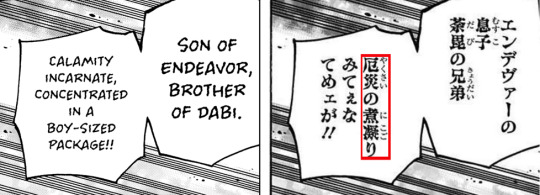
Kusatte Nī-chan’ (腐って兄ちゃん “rotten big brother”)
I’ve found ‘kusatte’ being used generally for food with the meaning of something that “has gone rotten/spoiled/decayed” but also for things with the meaning they “aren’t anymore what they were but are ruined”. As a result it can be used also to imply someone “had become a degenerate, morally bankrupt or corrupted” but also ironically “to be depressed/dispirited/discouraged”.
In chap 349 Tōya refers to himself as his ‘Kusatte Nī-chan’ (腐って兄ちゃん) when talking with Shōto. He might refer to his body, to his mind, to his moral sense (as he has turned into a Villain) or how he is no more a good big brother, which would make sense since Shōto refused to acknowledge him as such. Everything in Tōya is falling apart so he might refer to all of the above.

Kuzu (屑)
'Kuzu' (屑) has assurted meanings, “vaste”, “scrap”, “garbage” and as you can see none of them is nice is used toward a person. I've also seen it translated as just “scum” when referring to people.
This is how Shōto refers to his father in chap 31/53. Interesting enough Tōya instead uses ‘gomi’ (ゴミ “trash”) to talk about the Villains who wanted to join the league of Villains and that he decided to burn instead (Chap 115/220).
Although they seem to mean the same, ‘gomi’ is used for the garbage that accumulates naturally, so it can be found on the roads while 'kuzu' is the garbage created by humans. It's not a big distinction so for Horikoshi the choice could have been casual but if it wasn't it could kind of imply whose Villains were born that way while Enji turned himself into scum. Still, I'm speculating.
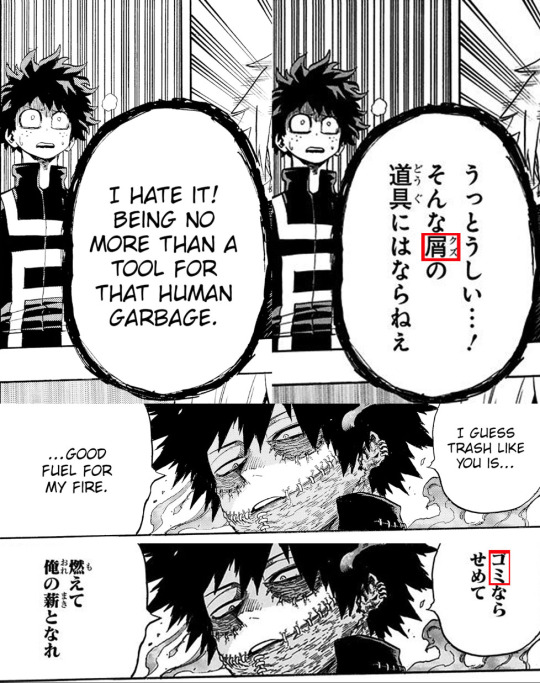
Maki (薪 “firewood”)
It's technically not an insult but when Tōya wants to burn someone to death he claims he wants to turn them into 'maki'. He does so with the Villains he burned in chap 115 and says he wants to do the same with Shōto in chap 351.
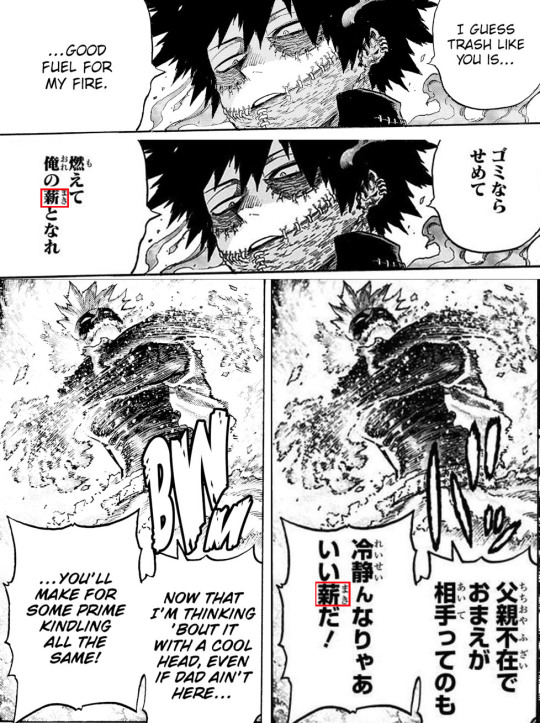
Not your name but your Quirk
I'm not sure which level of rudeness this would reach as there's no equivalent in real life as people have no Quirks... and in the manga this is made even more complicate by the fact some chose as their Villain name the name of their Quirk (All for One, Twice) but well, since the characters in question who did it had their own Villain names and were enemies, it's likely not meant to be polite...
In chap 238 Tōya calls Geten 'kōri yarō' (氷野郎 “Ice-guy/Ice-bastard”), though there's to say Geten never introduced himself by name and Geten started calling him by Tōya's Quirk name, 'sōen' (蒼炎 “blue flame”), first (chap 230),
‘Kōri’ (氷) means “ice”, and it's often how are called ice Quirks types. As said before 'yarō' (野郎) mean “guy” but unless you're familiar with that person, it comes out as rude so it's often translated as "bastard".
It's worth to say that 'sōen' (蒼炎 “blue flame”) is the name that Geten gave to Tōya's Quirk as, when he met him in chap 228 he called Dabi 'Sōen no tsukaite Dabi' (蒼炎の使い手荼毘 “Blue flame user Dabi”).
On the Quirk registry, Tōya's Quirk likely wasn't signed as such as, when Tōya was born, his flames weren't blue yet. Still, after Geten started calling as such his Quirk that was acknowledged as Tōya's Quirk official name (where previously it was always labelled unknown).
Geten's Quirk instead is named differently than just ‘Kōri’ (氷), the official name is 'Hyōsō' (氷操 "ice ply").
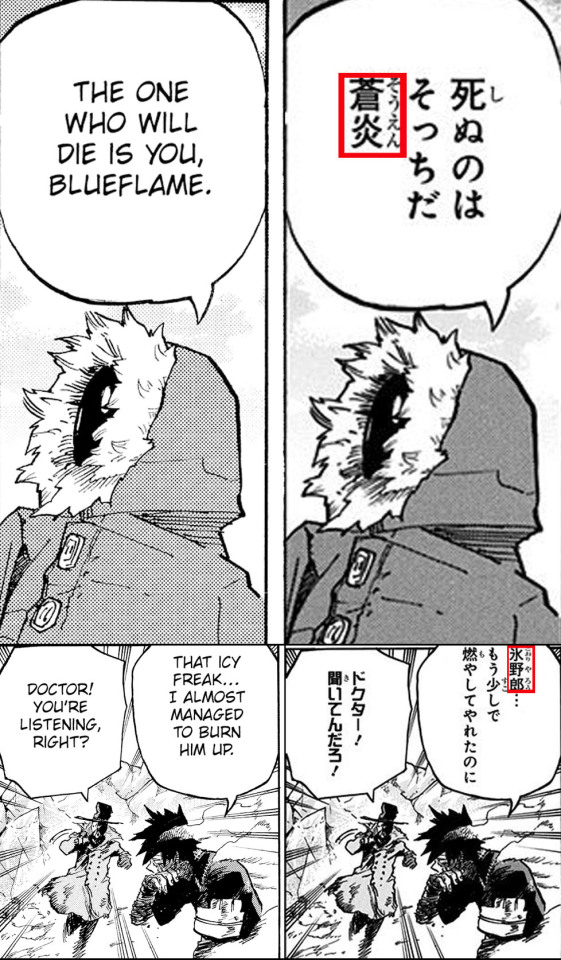
NOT AN INSULT BUT...
Seigi no mikata (正義の味方 “ally of justice”)
Of course this doesn't feel like an insult at all if it wasn't that when Tōya used it to refer to Enji in chap 293 after denouncing his crimes it felt pretty sarcastic and mocking.

Ore no jōi gokan (俺の上位互換 “superior in rank to me/my upwardly compatible/my upgrade”)
Again, this is not meant to be an insult at least Enji doesn't mean it as an insult when, in chap 40, he tells Shōto that's what he is... but, of course, Shōto rightfully isn't happy with such definition.
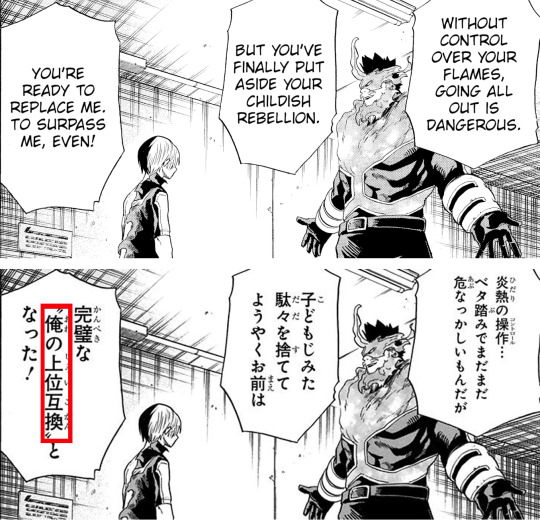
CONTINUE IN THE NEXT PART!
#this is so interesting!!#thank you#bnha#bnha meta#bnha translation#i love this blog and their posts ❤️
25 notes
·
View notes
Photo
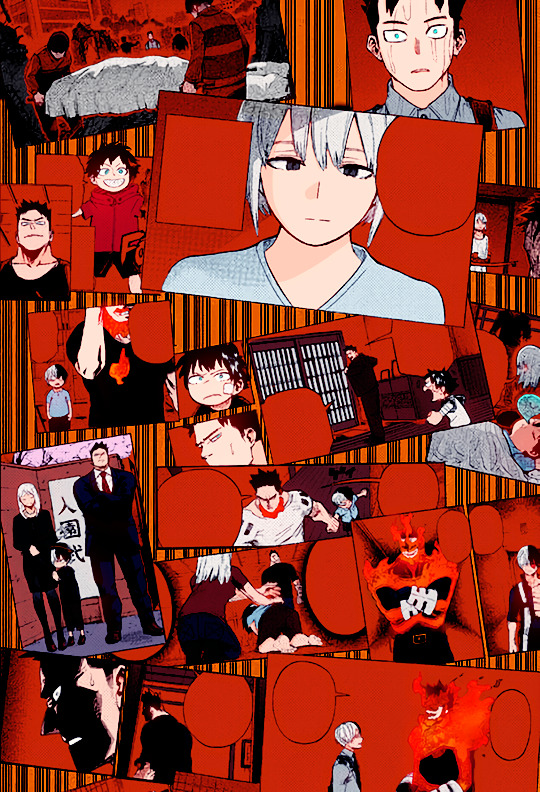
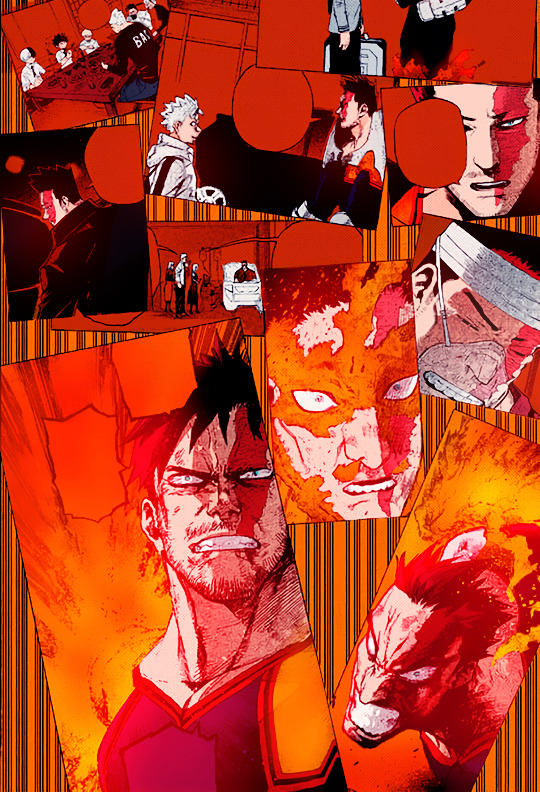
Touya! I’m sorry… I’m sorry, I never made it to Sekoto Peak!! Rei! I’m sorry for pushing you to the breaking point. Fuyumi… I’m sorry for leaving you to pick up the pieces! Natsuo… I’m sorry for neglecting you like I did! And, Shouto! I’m sorry!!
@animangacreators Challenge #20: Father’s Day → Make a creation of your favorite canon father character.
270 notes
·
View notes
Note
What do you think of what has happened in the recent chapters of MHA?
I don't want to be overly negative, but... the short version is I don't like a certain key fact and it's borderline ruined the story for me, at least in terms of thematic impact. I'm still interested to see how the characters end up, particularly the League, and reading for them.
The AFO reveal is honestly kind of... boring to me. I just don't care when it's a sudden "surprise! Bad decisions weren't our bad decisions after all!" This trope is consistently a pet peeve of mine (looking at you, flower plot in 2ha), almost as annoying as "it was all a dream," because I feel like it's similar: a bait and switch. Don't make me care in one way and then tell me "never mind, it's actually much simpler and you don't have to actually ask all those pesky moral questions."
Setting a character up to have lacking agency be their whole thing is great. Setting a character, or in this case characters, to have absolutely none is thematically uninteresting. The questions about Kotaro's morality and Nana's are interesting. I want to ask them and wrestle with them! That's where the themes are found.
And sure, Shigaraki was always a grooming victim, and I've pointed that out millions of times. But the reveal that this went further than we could possibly dream to where Kotaro and Nana are basically... absolved, is just so unnecessary. It adds nothing to the characters or themes, but it does whittle away at the interesting flawed human aspect of it.
It's lazy writing that screams "I am not sure I did a good enough job convincing my audience he's redeemable so I'll hit y'all with a hammer" when in reality, if you ask me, Horikoshi should have more confidence. He's not perfect but he did convince many ppl of Shigaraki's redeemability. He didn't need to quash any possible discussion about it; leaving things for people to chew on is actually interesting.
44 notes
·
View notes
Note
What do you think of what has happened in the recent chapters of MHA?
I don't want to be overly negative, but... the short version is I don't like a certain key fact and it's borderline ruined the story for me, at least in terms of thematic impact. I'm still interested to see how the characters end up, particularly the League, and reading for them.
The AFO reveal is honestly kind of... boring to me. I just don't care when it's a sudden "surprise! Bad decisions weren't our bad decisions after all!" This trope is consistently a pet peeve of mine (looking at you, flower plot in 2ha), almost as annoying as "it was all a dream," because I feel like it's similar: a bait and switch. Don't make me care in one way and then tell me "never mind, it's actually much simpler and you don't have to actually ask all those pesky moral questions."
Setting a character up to have lacking agency be their whole thing is great. Setting a character, or in this case characters, to have absolutely none is thematically uninteresting. The questions about Kotaro's morality and Nana's are interesting. I want to ask them and wrestle with them! That's where the themes are found.
And sure, Shigaraki was always a grooming victim, and I've pointed that out millions of times. But the reveal that this went further than we could possibly dream to where Kotaro and Nana are basically... absolved, is just so unnecessary. It adds nothing to the characters or themes, but it does whittle away at the interesting flawed human aspect of it.
It's lazy writing that screams "I am not sure I did a good enough job convincing my audience he's redeemable so I'll hit y'all with a hammer" when in reality, if you ask me, Horikoshi should have more confidence. He's not perfect but he did convince many ppl of Shigaraki's redeemability. He didn't need to quash any possible discussion about it; leaving things for people to chew on is actually interesting.
44 notes
·
View notes
Text
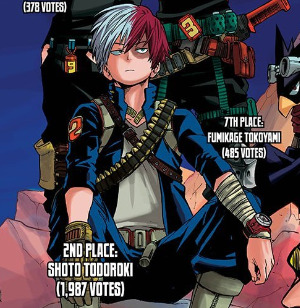
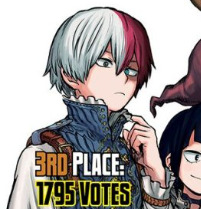


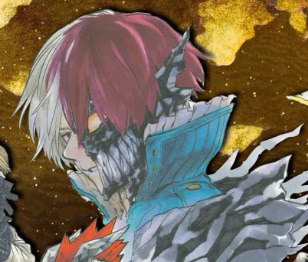


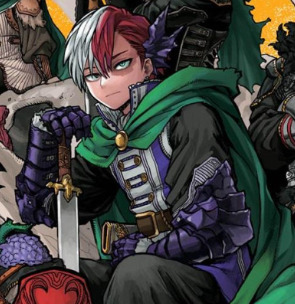

9 popularity polls - Congrats to Shouto for always staying in the Top 3!
94 notes
·
View notes
Text
Weird thing from Monotone Princess - Blair seduces schoolchildren
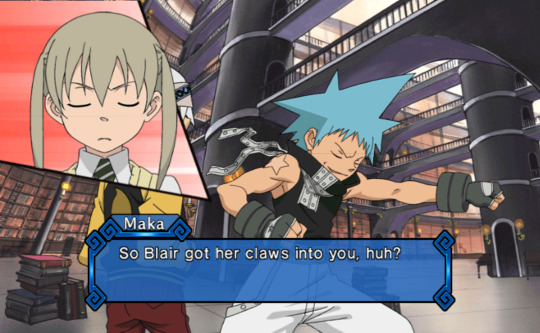

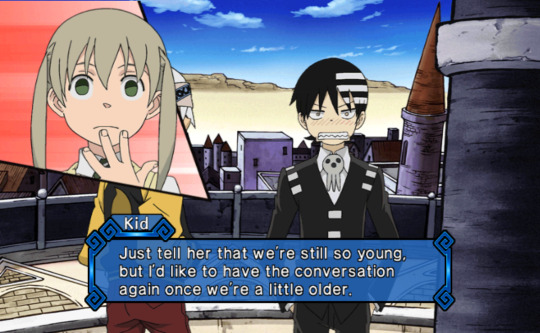

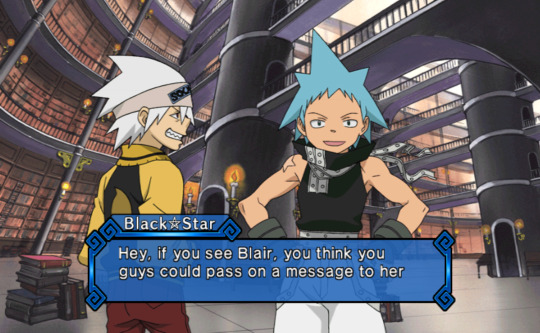
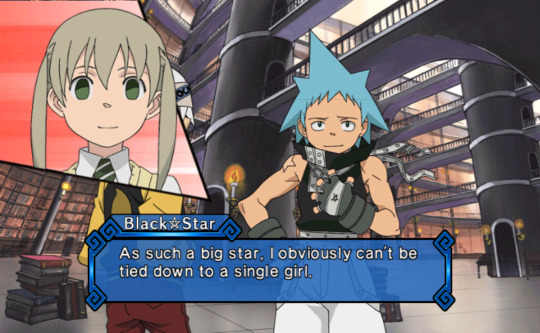
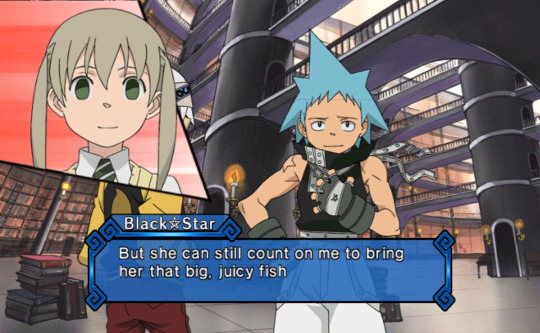
Just to proof that I'm not making up some urban legend with the previous post, one example of weird shit in that game lol.
65 notes
·
View notes
Note
hey king don't know why everyones being so malicious in asks recently i think you're spot on abt everything tbh ANYWAYS can i perchance get ur opinion on ace!hawks headcanon pls and thank you would be appreciated
Thank you for your kind words!
While I don't personally think or write of Hawks as ace, I'm sure I can think of an ace!hawks very easily. I know I wrote out somewhere, in fic or meta, that Hawks likely thinks of other people as if he's seeing them through glass. A remnant of his earliest socialization being a TV screen. And that extends to how he visualizes himself (on one side of the glass) and views others - also all his shielding habits/clear fear of emotional exposure. There's a lot of both not understanding people and also not wishing to be perceived.
I bring this up because I think Hawks would, especially an ace!Hawks, be aware that sexual attraction exists, but it would be something that exists firmly on the other side of glass, and not on his side, just another thing that makes him distant and different. Especially when he is so clearly fetishized by his fans, and a large part of his stated in-canon appeal is that he's attractive and charismatic. Much like he already does in canon, it's very easy to think of him going through the motions and acting as others do to deflect anyone realizing he truly doesn't feel this stuff.
I think that's a very relatable queer feeling (not just for those on the ace spectrum). Belonging, realizing the world around you isn't for you and that you never quite fit.
16 notes
·
View notes
Text

Man I feel bad that I haven’t been posting but like? To all my college peeps out there, do u regret ur major? I got accepted to the colleges I wanted but I’m not sure abt my major 🫣😀
41 notes
·
View notes
Note
I'm really worried now about how bnha is going to end. I fell in love with the story because a lot of horikoshi's hero characters (nana, enji, hawks for example) were allowed to have flaws while his villain characters were still painted as sympathetic and human without having their villainy be erased. Now I'm feeling like hori is trying to turn this into a good vs bad kind of thing and the message is going more and more into the direction of some people are in fact born evil. on the one hand, we are constantly being told that all villains are human and that deku is special because he can see that, on the other hand we have AFO who is supposed to be the bad guy behind it all and heartless and whom the narrative never sympathizes with. it's all very odd to me. You could potentially argue that afo is a product of his environment and that nana, Kotaro, and shigaraki all made their choices in the end no matter how much they were being manipulated, but I got the feeling that the narrative doesn't believe that and even if it does, it bothers me that it refuses to acknowledge it. it feels so empty and cowardly, like horikoshi can't decide between "this guy is the big bad and just pure evil" and "every villain has a human heart" and like he doesn't actually believe in redemption as a concept, only in good people who do bad things but don't mean it and bad people who are really just bad. there's just something gross about it in general
I mean... yeah. That's why it's a thematic mess.
I will say that I think Hori isn't attempting to argue that he doesn't believe in redemption; it's more that
he wants to please everyone, and actually
he wants everyone to root for redemption.
By Trying to Please Everyone, You've Pleased No One.
I've actually talked about this before particularly in regards to the Endeavor arc, where it felt thematically confused because he was trying to placate both sides--people who didn't want Enji redeemed because they feared he would wash away the abuse, and people who wanted him redeemed. And we know Horikoshi initially had different plans for Enji but changed it, so this is partly to blame as well.
But the reality is it's a stronger story if the story isn't written to be enjoyed by everyone. If people can dislike parts of it. Even if people scream about how it's morally bad for saying circumstances influence how people become or something like that. (Those attacks come from genuine pain, and I honestly get the feeling that Hori is very, very aware of this, especially considering how visceral he writes abuse. But that doesn't mean they are themselves valid criticisms.)
You can't please everyone. You just can't. No one wants every single ice cream flavor melted together. Not every story will be for everyone. And no, that doesn't mean you should be deliberately hurtful, but if you're writing a story where the abuser is redeemed, if you want to portray the abuser as human, some victims may not want to read it. But many will want to read it. And both are okay. Some people will misunderstand you, and that's just--life.
The reality is that in this world everyone has competing needs, and what can meet someone's need doesn't meet another's, and that's okay. The beauty of humanity is that with all the billions of us on this earth, someone should be able to help meet someone else's needs in a certain area. You can't feed everyone, but you can feed someone, and watering down the story so that it's basically now devoid of nutrients/what makes a story interesting doesn't actually help anyone. By trying to please everyone, you've pleased no one.
Hori Is Very Pro-Redemption
I genuinely think Hori somehow decided to try to make Shigaraki extremely palatable not because he doesn't believe in redemption, but because he wants everyone to believe in it and root for Shigaraki.
It's not unique for him to retcon characters' mistakes; like I said, he's done this with Enji, with All Might, and with Hawks where he very obviously swerves from the initial plan. However, that weakens the very themes and the characters, and makes the story less interesting and objectively less well-written.* And now this AFO reveal, considering it's the main plot, kinda throws these more subplot ideas to the back burner and weakens the entire frame of the story rather than just the subplot.
So Hori's into redemption. The problem is that he doesn't know how to convince everyone that redemption is worth it, and so makes it so obvious that it's devoid of any actual interesting questions we can ponder. Essentially if you refuse redemption for Shig now, what's wrong with you? It's nigh morally impossible not to.
But I, Redemption Arc #1 Fan, like it when it's questionable. Redemption, for me, is never about deserve.
It's disappointing, but I've also seen way worse lol in terms of thematically undermining a story at its ending. So, no, I'm not happy about it and I will critique it. But I still want to see the characters I've loved for so long get their happy endings.
*Yes, "good writing" is an opinion; however, there are general consensuses of what constitute good and bad writing. This type of thing--removing agency completely in the last hour--is bad writing.
19 notes
·
View notes
Text
Friends, Romans, countryfolk...
Hey it's me, your friendly neighborhood Laura! I have an assignment for my environmental economics course this semester that requires gathering some survey data for analysis purposes. I'm still about 20 responses short on the amount of data I need, and I'd like to have all my data gathered by tomorrow evening (04/15) if possible, so I would really appreciate it if a few of my followers could take a quick survey.
The topic of the survey is respondents' hypothetical willingness to pay a special tax in order to fund wetlands preservation (more details are included on the survey page) and the only requirement for participation is that participants must be over the age of 15 and have been legally employed at some point in your life, even if you are not currently employed. US residents are preferred but not necessary, just please for the sake of my data indicate if you are using a currency other than USD.
It's totally anonymized, and very short (just a few demographic items, then two mandatory questions plus optional comment boxes), should only take you about five minutes to answer.
Anyone willing to help a nontraditional student out with (finally!!) getting their degree will be incredibly appreciated!
37 notes
·
View notes

